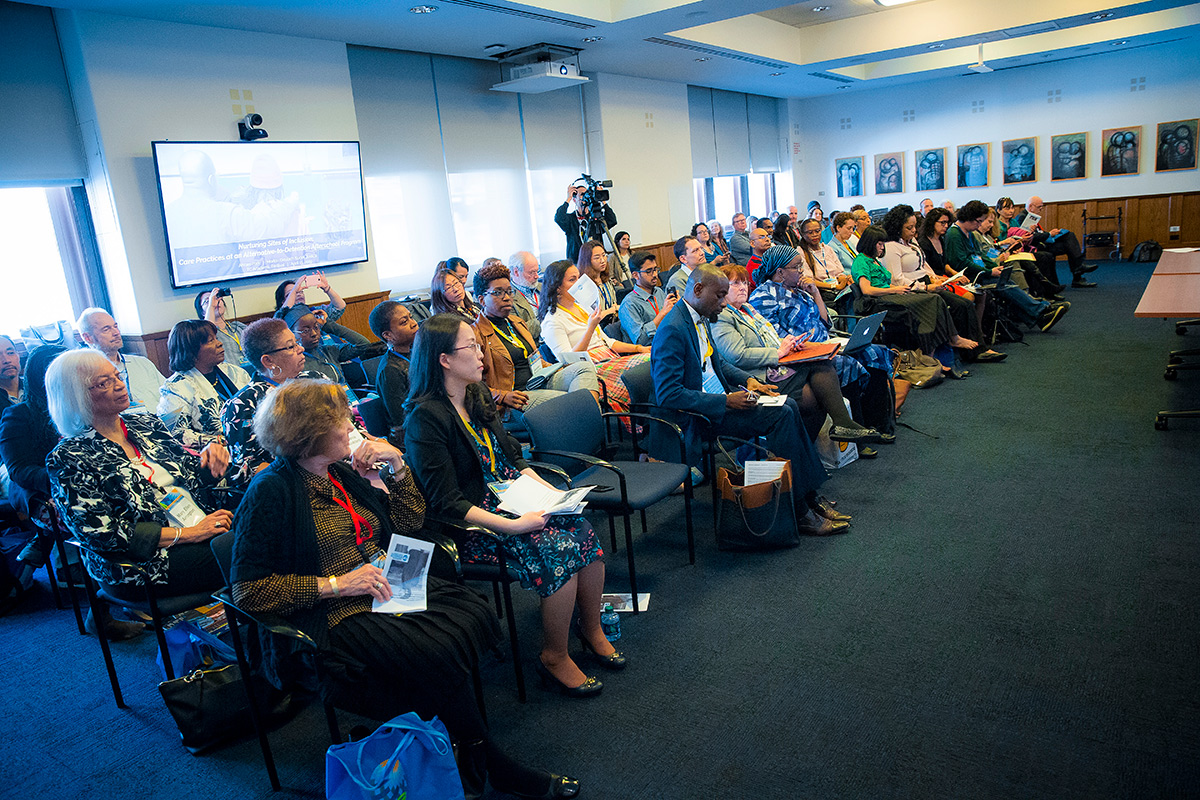At a breakout panel called “Social Justice in Practice,” Mariame Kaba, a community organizer, educator, curator, prison abolitionist and founder and director of Project NIA, received the Morton Deutsch International Center for Cooperation and Conflict Resolution (IMD-ICCR) Award, established in 2005 in the name of ICCCR’s founder, the late Professor Emeritus Morton Deutsch, an eminent social psychologist peace leader who worked to promote constructive conflict resolution. Kaba received the Outstanding Scholar-Practitioner Award for her ongoing work in prison justice.
Ahram Park (M.Ed. ’19, International Education Development), a doctoral candidate in TC’s Communication, Media and Learning Technologies Design Program, received the 2019 Morton Deutsch Award for Outstanding Graduate Student Paper for her dissertation, a “participatory ethnographic study” of an alternative-to-detention after-school program in Brooklyn..
ADVOCATING FOR SAFE HAVENS Ahram Park said that "the care framework" at Voices, the after-school program she studied, "could help us to reimagine and restructure" safer schools.
Kaba was interviewed by Hakim Mohandas Amani Williams, Associate Professor of Africana Studies and Director of Peace & Justice Studies at Gettysburg College. Earlier in the day, Williams had received TC’s Early Career Award for his work as a peace educator and supporter of educational equity.
Kaba described her career spanning three decades, during which she taught high school and founded NIA, a grassroots organization working to end youth incarceration, and several organizations to combat violence against girls and women.
Kaba, an “Activist-in-Residence” at the Center for Research on Women at Barnard College, read from an essay she wrote about a conversation over lunch she had with Monica, an 18-year-old mother who had just been released from prison. Monica is not interested in following the long list of rules that are supposed to govern her life on parole, Kaba said, and even if she were, the cards were stacked against her from the minute she became free. For example, she is supposed to go back to high school, but many schools will not readmit a student who has been involved in the prison system. She has no money, and she will have difficulty getting a job. She makes clear to Kaba that she will continue her pre-prison life of “struggling, hustling and surviving” to feed herself and her family.
Every parole story is unique, but, Kaba said, Monica’s story exemplifies the systemic problems with the prison industrial complex in the United States that threaten incarcerated youth and adults with “premature death.” These problems start at school, where some students are marginalized by “irrelevant curriculum” and “complete and utter racism of some of the educators.” Many students become disengaged in school and fall victim to “excessive expulsions, detentions and arrests on school campuses.” Many young people who serve time in prison never get back to school, given the hurdles put before them by the parole system. Kaba believes the school-to-prison pipeline and the prison and parole systems simply revisit violence on young people who have already experienced it in one form or another.
The solution also lies not just in abolishing the prison system, she said, but in building in its place community-based organizations that provide support and accountability for all parties involved in violence. NIA engages young people in “life affirming,” creative activities such as hip-hop cyphers, designed to build support for young people and families in their communities and encourage them to see themselves as “people with agency.”
The most important feature of what Kaba calls “transformative justice” organizations for young people is leadership by young people themselves and a base in the community rather than in a profession or a bureaucracy.
The day included an extensive lineup of presentations, panels and other events featuring TC faculty, students, alumni and staff.Academic Festival 2019
“Start where you are, start with your people,” she said. “Think about what’s in your community and how you can contribute to it.”
Park summarized her study at Voices, an after-school program for ages 7 through 16 in several locations in New York City. Voices is a court-mandated alternative to detention where children can develop tools for self-care and to care for one another, by participating in extracurricular activities that might be found in any well-resourced school, such as art, theater, sports, photography and video instruction, and in town-style meetings at which participants can plan activities and projects and suggest new ones.
Park found that Voices helps participants develop their own voices and sense of agency. More important, she suggested, the “care framework” at Voices “could help us to reimagine and restructure” schools themselves, to become safe havens in the “physical, mental and emotional sense” and beyond.
